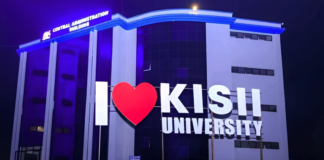National Bank of Kenya (NBK) has moved to assert control over the Nairobi Upper Hill Hotel following a prolonged legal battle over a defaulted loan.
In a notice dated August 18, 2025, the bank announced the appointment of Kamal Anantroy Bhatt of Anant Bhatt LLP as Receiver and Manager for the property.
The receiver is now responsible for the hotel’s affairs, business, and assets. Any dealings involving the hotel without his written consent will be considered unlawful and may prompt legal action.
The move comes after years of litigation involving the hotel’s owner, Geoffrey Wahome Muotia, who originally secured financing nearly a decade ago.
In 2014, Muotia obtained an overdraft of Sh10 million, a commercial mortgage of Sh236 million, and a term loan of Ksh35 million bringing the total principal to Ksh281 million. With accumulating interest and charges, the debt ballooned to Sh447 million by early 2025.
Muotia had sought multiple court interventions to halt the enforcement actions, including injunctions to stop the auction. However, these appeals were rejected at various levels.
In July 2024, Environment and Land Court judge Jacqueline Mogeni ruled she lacked jurisdiction over the case and recommended that Muotia lodge his challenge in the High Court.
Subsequently, the High Court also dismissed a fresh attempt to block the sale, reinforcing NBK’s right to reclaim the property.
The hotel, situated along Mawensi Road in Nairobi’s Upper Hill district, is a four-storey property featuring guest facilities such as a business centre, restaurant, bar, conference halls, and event spaces.
Despite its prime location and amenities, the hotel’s operations have struggled amid mounting debt and industry saturation. Similar hospitality assets have recently faced forced sales due to financial strain.
NBK had earlier instructed Keysian Auctioneers to schedule an auction, initially set for February 2025, to recover the outstanding debt. Efforts by Muotia to block the auction including claims of undervaluation and mismanagement of the sale were ultimately unsuccessful.
Muotia contended that the forced sale value was significantly lower than the property’s market worth, which had appreciated markedly over the years.
With receivership firmly in place, NBK has significantly strengthened its position to recoup the owed amount. The appointment of a receiver marks a key turning point in the long-running saga, signalling that the bank is fully poised to enforce its financial claims.
The receiver’s mandate will involve managing or disposing of the property to recover the debt, while ensuring proper oversight of its assets and operations.
This development underscores the risks associated with prolonged loan defaults and the legal limits borrowers face when challenging enforcement actions. For NBK, the receivership represents a final step toward debt recovery, reinforcing the importance of secured lending and judicial clarity in stakeholder disputes.
Let me know if you would like further insights into the implications for the hospitality sector or collateral enforcement trends.
Written By Ian Maleve



















